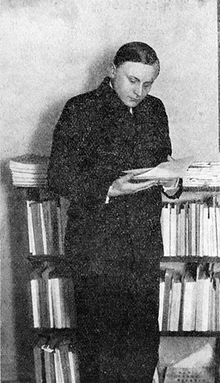Vilém Závada
Vilém Závada | |
|---|---|
 Závada in 1930 | |
| Born | 2 May 1905 Ostrava, Austria-Hungary |
| Died | 30 September 1982 (aged 77) Prague, Czechoslovakia |
| Resting place | Vyšehrad Cemetery |
| Occupation | Poet, translator |
| Nationality | Czech |
| Alma mater | Faculty of Arts of the Charles University |
| Notable works | Panychida Na prahu |
| Notable awards | National Artist of Czechoslovakia |
Vilém Závada (2 May 1905, Hrabová, now part of Ostrava – 30 November 1982, Prague) was a Czech poet, translator and journalist.
Biography
Závada was born in to the family of a metal worker, his father died during the First World War, an event which left a huge impression on his future works. His mother raised Vilém and his two brothers in impoverished circumstances. Závada graduated from his doctorate in philosophy at the Charles University and started his literary career.[1]
Initially a representative of Poetism, he broke with the literary style in favor of a more gloomy and pessimistic romanticism. In 1927 Závada wrote his most famous work, Panychida, a work which was for the commoderation of the fallen of the First World War as well as a melancholic meditation on life itself.[2]
In the 30s Závada mostly worked as a magazine editor. After the invasion of Czechoslovakia by Nazi Germany, he became more reclusive and wrote Hradní věž, which was about his coming to terms with the fate of his country.
After the German surrender Závada joined the Communist Party of Czechoslovakia however was not involved in party politics. After a period of simplistic acceptance of the optimism of post-war conditions, at the end of his life he returned to the poetry of existential depth and tragedy of life.[1]
In 1948 he was appointed the director of the National Library of Czechoslovakia, a position from which he resigned in 1949. In 1958 he was again temporarily appointed head of the library.[3]
in 1966 he was awarded the position of National Artist. In 1969, he was awarded in the anniversary of the 100th anniversary of Otokar Březina's birthday.[4]
Závada died in 1982 in Prague at the age of 77 and was buried at the Vyšehrad Cemetery.
References
- ^ a b Putna, Martin. Česká katolická literatura v kontextech: 1918–1945. Prague.
- ^ Budagova, Lyudmila (2001). Institute of Slavic and Balkan Studies (Russian Academy of Sciences) . History of the literatures of the Western and Southern Slavs. Vol. 3. Indrik.
- ^ "Kdo byl Vilém Závada". vladimirslavik.netstranky.cz. Retrieved 2021-05-15.
- ^ "Award of the Ministry of Culture with a commemorative medal for the 100th anniversary of the birth of Otokar Březina". Bulletin of the Otokar Březina Company. 72: 16. 2018.
